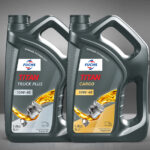WearCheck launches bespoke grease analysis kits
WearCheck launches bespoke grease analysis kits
Specialist condition monitoring company, WearCheck, has always performed grease analysis during routine asset health assessments. Now, the company has launched a dedicated grease testing kit.
In addition to elemental analysis and particle quantifier (PQ) tests, the new test kits also undertake these assessments on grease being analysed: water by Karl Fischer, Fourier Transform Infrared (FTIR), microscopic particle examination, and image capture.
“With nearly 90% of all bearings being lubricated with grease, routine grease analysis is a vital part of a good predictive maintenance strategy,” says Steven Lumley, technical manager for WearCheck.
“WearCheck’s grease analysis programme is effectively used for a broad range of grease-lubricated systems operating in a wide variety of applications, including wind turbines, industrial bearings, and grease-lubricated gearboxes and hubs,” she elaborates.
Lumley says that monitoring grease condition is a vital part of maintaining and tracking equipment reliability. “It can detect lubricant breakdown and aid in identifying potential problems before serious mechanical damage occurs. Corrective action can be taken before other signs of deterioration begin to show, such as increases in operating temperatures, noise, and vibrations,” she notes.
Monitoring the condition of your grease can also provide important information on the quality of the grease and its performance, as well as help adjust relubrication intervals. “Our grease analysis programme is designed to monitor the health of the lubricant, the health of the machine, and levels of contamination through a series of chemical and physical tests,” Lumley continues. “With routine monitoring, effective grease analysis can minimise unplanned repairs and downtime, while extending the life of your machinery.”

Here, we provide a breakdown of the tests included in WearCheck’s grease testing programme.
Elemental analysis
An elemental analysis of the grease is performed using Inductively Coupled Plasma (ICP) spectroscopy. The spectrometer measures the concentration in the grease of wear metals such as iron, lubricant additives like phosphorus, thickeners like lithium, and contaminants such as silicon.
Particle Quantifier Index
The PQ gives a measure of the total ferrous content of the grease sample. From this measurement, the total amount of ferrous (iron) debris can be determined, irrespective of the size of the particles.
Fourier Transform Infrared
The FTIR test produces an infrared spectrum often referred to as the “fingerprint” of the lubricant, as it contains specific features of the chemical composition of the grease. The spectrum can be used to identify types of additives and trend oxidation byproducts that could form as a result of high operating temperatures and thermal degradation.
Karl Fischer Moisture
Water contamination is detrimental to any lubricant and can shorten the service life of a bearing by accelerating wear. The Karl Fischer method for determining moisture content is recommended, as even small amounts of water contamination can cause corrosion, base oil degradation, and additive depletion in grease.
Microscopic Particle Examination
An MPE is performed by filtering the grease through a membrane patch of a known micron rating and examining any debris under a microscope. The membrane patch is examined for wear, contamination, and colour. An MPE can provide clues to the source of the debris and the potential severity of a problem that may be causing it.
Published by
Focus on Transport
focusmagsa




